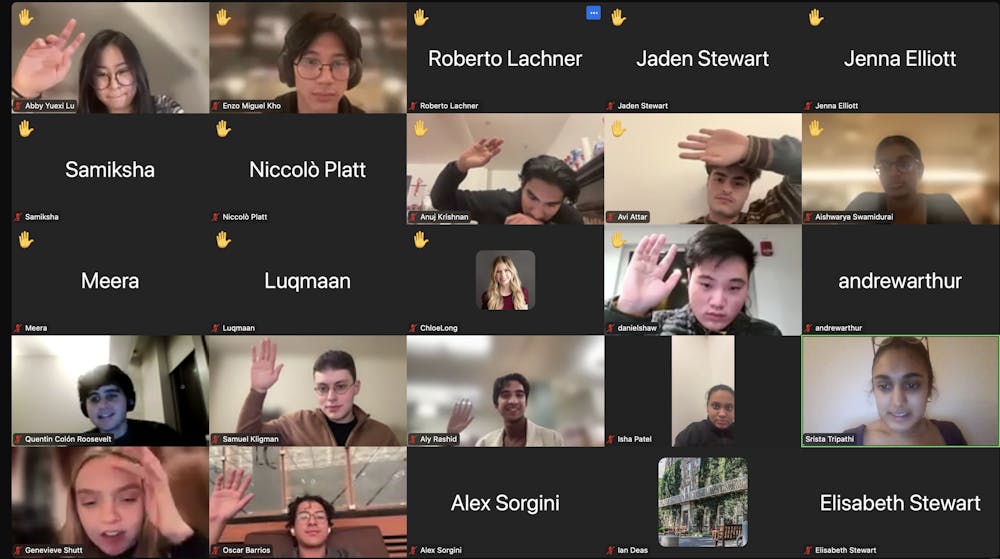The Undergraduate Student Government (USG) Senate met via Zoom on the Sunday following Thanksgiving Break to review next steps for the referenda that were passed in the recent election, hear a presentation on Title IX procedures, and approve a Social Committee budget request for a Dean’s Date celebration. The meeting was the second-to-last under current president Avi Attar ’25, before president-elect Enzo Kho ’26 takes over.
The four referenda that undergraduates passed last week, which advocated for enhanced employment standards for undergraduate workers, fossil fuel disassociation, pass/D/fail options for lower-level language classes, and the University’s divestment from weapons manufacturer, were all passed under the USG’s advisory power. In the meeting, USG representatives discussed the requirement that they now write position papers based on the referenda. These position papers will include an explanation of the official position of the undergraduates as stated in the referendum resolution, action steps for the USG Senate, and recommendations for other relevant University or student groups.
The representatives will choose members to write the position papers over winter break and turn them in by the start of next semester.
The Senate voted to close the public portion of the meeting and enter executive session before discussing the referenda. However, due to a miscommunication, Senate members did not request that reporters from The Daily Princetonian exit.
Prior to the meeting entering executive session, Director of Gender Equity and Title IX Administration Randy Hubert led the presentation about Title IX, addressing the formal grievance process, myths and misconceptions regarding Title IX, the alternate resolution process, common terms, and confidentiality for students.
Hubert’s presentation initially concentrated on the importance of mandatory reporting. “For undergraduate students it’s Residential College Advisors and Community Living Advisors who are mandatory reporters,” she said. “The mandatory reporting requirement really has two goals. One is to ensure that the impacted individual consistently receives accurate information about resources and reporting options that are available to them, and that they have access to supportive measures.”
“The Title IX office is a clearinghouse for all those reports of sexual misconduct. Someone who’s experienced sexual misconduct may not be aware of a pattern of that behavior, but my office would be aware of that, and if there’s a need for the university to intervene based on a concern about the safety of the campus community, that reporting requirement allows us to have enough information to be able to do that when appropriate,” Hubert added.
The presentation then shifted towards the formal grievance process, which is an official investigation and adjudication of allegations of sexual misconduct which involves official investigators who collect information through interviews and documents. Hubert clarified some misconceptions that surround the investigation process.

“There are two ways that investigations start,” she said. “Almost always, they start because the impacted student chooses to file a formal complaint, which initiates an investigation. In very limited circumstances, my boss, who is Vice Provost for Institutional Equity and Diversity Michele Minter can initiate an investigation if she has a concern about safety to the University community, but that’s never done without consulting with the impacted student.” Hubert added that there is no set amount of evidence of misconduct that is needed to move forward with an investigation.
In the case that the formal process results in no finding as to whether University policy was violated, the office also facilitates an alternate resolution process. Speaking about this process, Hubert commented, “We try to give students as much agency as possible to decide where to report and what resources to use. As I mentioned before, there are limited circumstances when a Title IX investigation would be initiated without a student wanting to proceed. There’s always consultation with the student before that happens, and we never force a student to be a complainant.”
The Senate also voted to grant the Social Committee’s budget request of $4,000. The funds will be used for lighting equipment for this fall’s Dean’s Date celebration, one of the Social Committee’s signature events.
Andrew Arthur is a News contributor for the ‘Prince’ from London.

Please send corrections to corrections[at]dailyprincetonian.com.
Correction: A previous version of this story stated that USG did not request that observers exit the meeting when they voted to go into executive session. In fact, USG asked some observers to leave, but did not request the same of the ‘Prince’ reporters present. The ‘Prince’ regrets this error.








